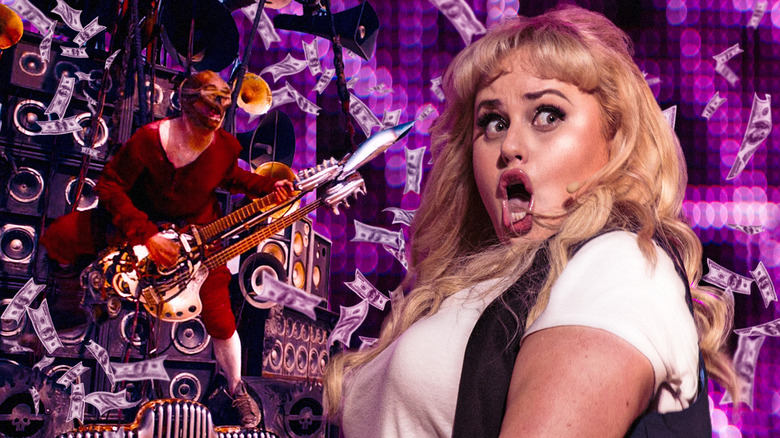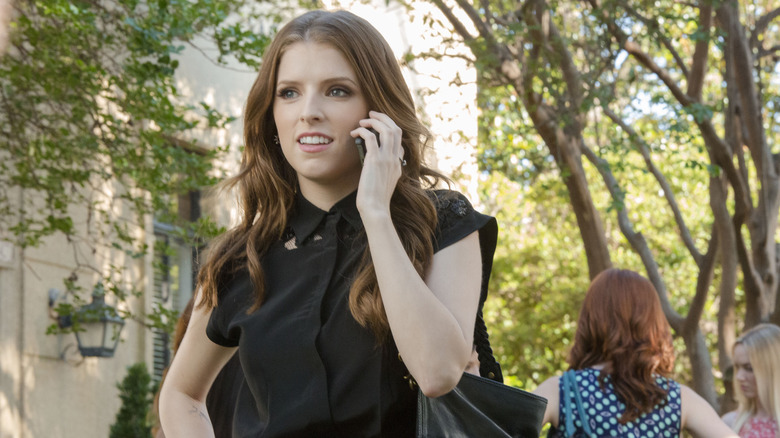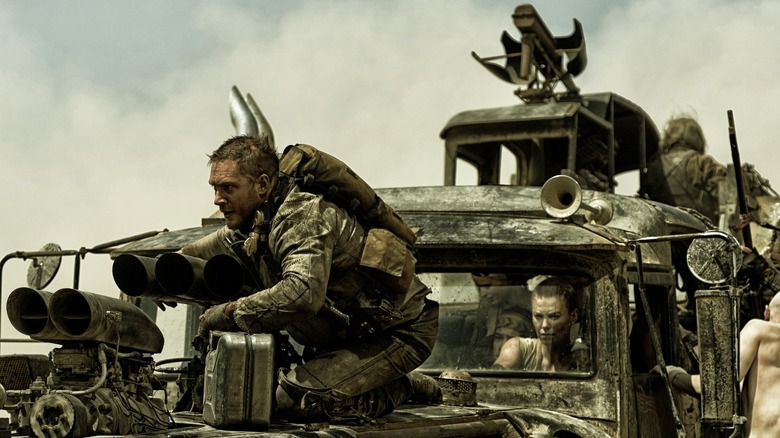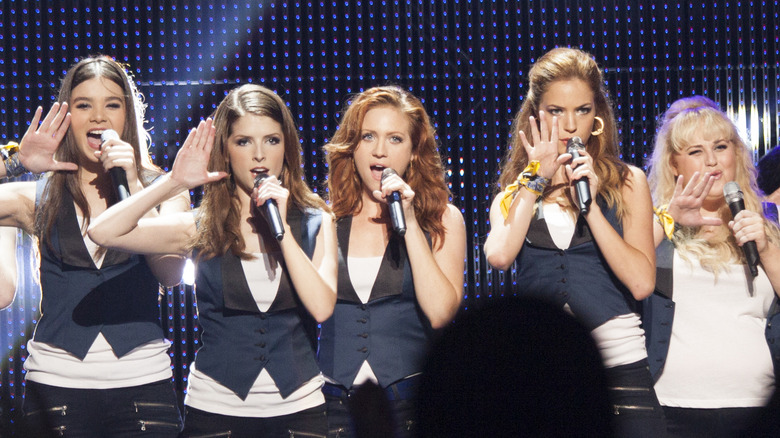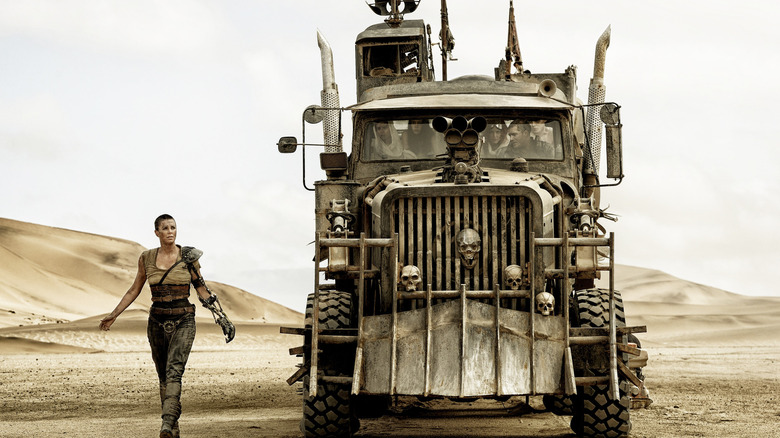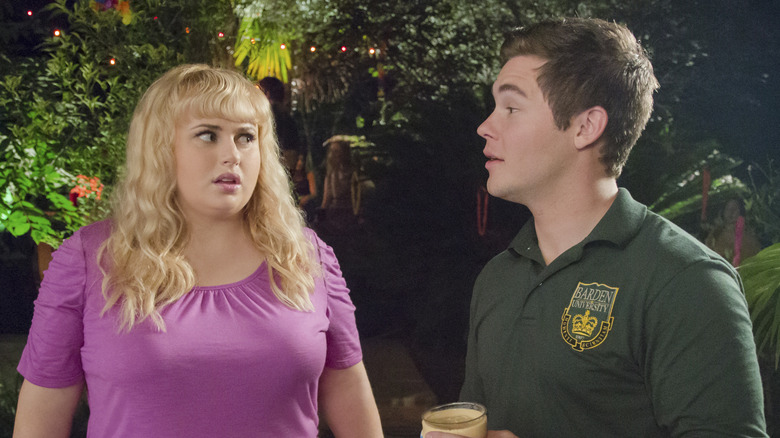10 Years Ago, A Truly Bizarre Battle Of The Sequels Went Down At The Box Office
(Welcome to Tales from the Box Office, our column that examines box office miracles, disasters, and everything in between, as well as what we can learn from them.)
"I don't understand how they're not still shooting that film, and I don't understand how hundreds of people aren't dead." Those are the words of "Ocean's 11" director Steven Soderbergh in 2017, marveling at the cinematic classic that is 2015's "Mad Max: Fury Road." 10 years later, its place in cinema history is unquestioned.
It might then surprise many people to know that "Fury Road" did not top the box office when it arrived in the summer of 2015. Despite its reputation, it was actually not an outright hit upon release. In stark contrast, Universal's "Pitch Perfect 2" opened directly against Miller's long-awaited fourth "Mad Max" film as counterprogramming and, in defiance of most Hollywood logic at the time, won the day. Both movies were part of a summer full of female-driven movies. Both of them walked down very different paths that converged on one fateful weekend.
"I went shopping at Target before the holidays, and all the DVDs for 'Pitch Perfect' were all sold out. And I was like, 'Oh, there's like something happening here,'" screenwriter Kay Cannon said to Variety in 2015. Something was happening indeed in the form of a bizarre, fascinating box office battle.
In this week's Tales from the Box Office, we're looking back at the showdown between "Mad Max: Fury Road" and "Pitch Perfect 2" a decade later. We'll go over how both films came to be, what happened when they hit theaters, what happened in the aftermath of those respective releases, and what lessons we can learn from them a decade later. Let's dig in, shall we?
The movies: Mad Max: Fury Road and Pitch Perfect 2
To say that these movies wandered down very different paths on the road to release would be a bit of an understatement. In the case of "Mad Max: Fury Road," it spent literal decades trapped in development hell. A couple of years after the release of "Beyond Thunderdome" in 1985, Miller first conceived of the idea for "Fury Road," which originally would have seen Mel Gibson return in the title role. Needless to say, that's not how things panned out. It would be a full 30 years before Miller would realize his vision.
On the flip side, director Jason Moore's first "Pitch Perfect" was released by Universal Pictures in September 2012 and became something of a sleeper hit. Against a very reasonable $17 million budget with a cast that included the likes of Anna Kendrick and Brittany Snow, it made $115 million worldwide. To Cannon's point, it also became a smash hit on home video. As a result, Universal confirmed "Pitch Perfect 2" at CinemaCon in April 2013, wasting very little time getting that train moving in the right direction.
That's generally how things go in Hollywood. If a movie is successful enough, a sequel will probably happen. On one side, we had a filmmaker who had a desperate passion to tell an epic story on the largest scale imaginable, hitting roadblocks every step of the way On the other side, we had a sequel to an unexpected hit that was a low-risk, high-reward prospect that would count as business as usual for just about any studio. Aside from the fact that these movies couldn't be more different in terms of what unfolds on screen, their paths to eventual release were also wholly unalike.
Mad Max: Fury Road was decades in the making
"Fury Road" as we know it takes place years after the collapse of civilization, with the tyrant Immortan Joe ruling over the Wasteland. When the warrior Furiosa (Charlize Theron) escapes with Joe's five wives, she must forge an uneasy alliance with the quiet loner Max (Tom Hardy). Car-driven chaos ensues.
Made for less than $1 million, the original "Mad Max" is one of the most profitable films of all time, leading to the two sequels that followed. A big part of what complicated matters with "Fury Road" is that it increasingly became a wildly expensive prospect, with an eventual budget north of $150 million. In a 2015 Q&A, Miller explained why the film was delayed for so long.
"The American dollar collapsed with 9/11, the budget ballooned, we had to get on to Happy Feet because the digital facility was [ready]. Then it rose again, and we had unprecedented rains in the outback of Australia. Where there was red desert there were now flowers. We waited a year for it to dry out. It didn't, so we had to take everything from the east coast of Australia to the west coast of Africa, to Namibia where it never rains.
"We had to do it old school, this is not a CG movie, we don't defy the laws of physics, and so we had to stage it," Miller added. "For 120 days, and every day was a big stunt day." Indeed, the movie unfolds as a largely practical stunt spectacular, filmed for several grueling months in the hot desert. It was a prime "suffer for your art" situation.
Pitch Perfect 2 was a sequel to an unexpected hit
Meanwhile, Universal's handling of "Pitch Perfect 2" seemed to largely go off without a hitch. The sequel focuses on the Barden Bells after a botched Lincoln Center performance, leading to a scandal that strips them of their performing duties. Their only shot at redemption? The world championships in Denmark.
It was somewhat unremarkable so far as the sequel development goes. Elizabeth Banks, who starred in the first installment, was tapped to direct the follow-up in January 2014, serving as her feature directorial debut. The entire core cast from the first entry returned and Banks was given a bigger but not too big budget in the $30 million range to work with. It all made sense.
"We made the first movie, we were like the Little Engine That Could — 'I think I can, I think I can' — and I don't think people really knew what we were doing, and now people really love it. It's really beloved," Banks said of taking on "Pitch Perfect 2" in an April 2014 interview. "Frankly, all I feel is pressure. I try to only work on things that I feel this passionately about. Directing takes more time and energy; I'm just wearing a few more hats this time around, but I wouldn't be doing it if I didn't feel a hundred percent passionately about it."
Banks and Universal went bigger with the sequel, getting the a cappella group Pentatonix to appear, in addition to adding more star power such as Hailee Steinfeld ("Ender's Game"). All the while, love for the first film continued to blossom, with the song "Cups" becoming a smash hit in its own right. Unbeknownst to Banks or the studio, this was going to translate to a bigger-than-expected debut for the sequel.
The financial journey
Warner Bros. and Universal both picked May 15, 2015, as the date to drop "Mad Max: Fury Road" and "Pitch Perfect 2," respectively. Both movies had some of the most-viewed trailers of the year overall, with "Fury Road" barely edging out "PP2." Both movies were aimed at very different audiences, meaning they would, in theory, be able to co-exist just fine.
Critically, "Fury Road" was met with a rapturous response, with /Film giving it a near-perfect 9 out of 10 review at the time. "Pitch Perfect 2," meanwhile, was met with a more mixed response. Marvel's "Avengers: Age of Ultron" kicked off the 2015 summer box office with a bang earlier in the month, but it was entering its third weekend of release. The coast was clear. On one side, we had an action-packed, widely-acclaimed blockbuster sequel. On the other side, we had a women-driven musical comedy sequel. Let them fight.
"Pitch Perfect 2" topped the domestic charts with a $69.2 million debut, besting pre-release estimates. It made more domestically in a single weekend than the first film did during its entire run. "Fury Road," which cost five times as much to make, had to settle for second with $45.4 million. That was largely how it went until July rolled around, when both movies fell out of the top 10, with effusive critical buzz carrying Miller's passion project, while sheer audience demand propped up Banks' directorial debut.
In the end, "Pitch Perfect 2" finished its run with $184.2 million domestically and $102.8 million internationally for a grand total of $287.1 million worldwide. "Mad Max: Fury Road," won the global battle, however, finishing with $153.6 million domestically and $225.8 million overseas for a grand total of $379.4 million in its original run.
Pitch Perfect 2 and Fury Road both found success, in their own ways
"Fury Road" made more money globally, but against its huge budget, it wasn't a big theatrical hit. It had to rely largely on post-theatrical revenue to turn a profit. Rest assured, it did profit, particularly after it won six Oscars after being nominated for 10, including Best Picture. The critical acclaim carried Miller's "Mad Max" epic in the short run. In the long run? It's become a timeless, almost universally heralded blockbuster that is nothing shy of spectacular. It will make money and be cherished for decades to come.
On the other side of the fence, "Pitch Perfect 2" turned a huge profit out of the gate, with Deadline estimating it made $140 million for Universal by March 2016. Though not nearly as big of a hit, "Pitch Perfect 3" arrived in 2017 to round out the trilogy, with the short-lived TV spin-off "Bumper in Berlin" expanding the scope of the franchise on Peacock as well. This sequel helped turn this into a fully-fledged cash cow for the studio. It's the kind of mid-budget original we don't see enough of in the pandemic era.
In both cases, success was achieved, albeit through different means. Though not a huge moneymaker initially, any studio in Hollywood would kill to have "Fury Road" in its library. By that same token, any studio would kill to stumble into a moneymaker like "Pitch Perfect" any day of the week. We don't have to lower one to raise the other, even if there was a clear winner out of the gate.
The lessons contained within
The big takeaway here is that success in the realm of studio filmmaking can — and should — take on many forms. Studios should take big risks with existing franchises like "Fury Road." They should also invest in mid-budget plays like "Pitch Perfect," because good things can happen. New franchises can't exist if original movies aren't made in the first place.
Another big thing here is how remarkable it is to consider that this happened 10 years ago, in the sense that it still feels like a fight to get movies aimed more squarely at women made at the highest levels on a more regular basis. Hollywood continues to be obsessed with older franchises aimed at men. All the while, movies like "It Ends With Us" come along and absolutely crush it at the box office. Certain audiences are seemingly starved for movies made with them in mind. "Pitch Perfect 2" benefited greatly by filling that void.
Just look at the whole Barbenheimer thing, where "Barbie" ($1.44 billion worldwide) came out on top over "Oppenheimer" ($975 million worldwide). The vast majority of studio execs probably would have been on Christopher Nolan, given the choice. Put simply and more broadly? Franchise-obsessed, male-focused thinking needs to change in a meaningful way. It would be to everyone's benefit.
